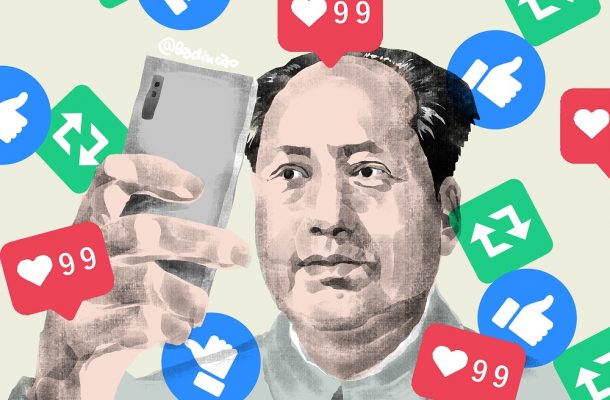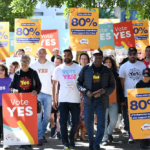China’s twitter war against the West

At times of political crisis, the Chinese government has demonstrated a willingness to deploy disinformation and influence operations to achieve its strategic goals. The regime has mobilised a long-running campaign of political warfare against Taiwan, incorporating the seeding of disinformation on digital platforms.
Our September 2019 report Tweeting through the Great Firewall investigated state-linked disinformation campaigns on Western social media platforms targeting the Hong Kong protests, Chinese dissidents and critics of the Chinese Communist Party.
In our latest report, Retweeting through the Great Firewall: a persistent and undeterred threat actor, we note that this campaign is ongoing, has refined its tactics and focus, and has pivoted to incorporate current protests and civil unrest in the US into pro-CCP narratives.
Working from exclusive access to a Twitter dataset of almost 24,000 accounts and 350,000 tweets it has taken down, we analysed the current evolution of this long-running campaign. The operation targeted audiences in Hong Kong and the Chinese diaspora more broadly, and was likely trying to exploit the internet’s underground marketplace for stolen social media accounts in order to disguise its attempts to drive engagement around narratives aligning with the interests of the party-state.
Twitter has been quite clear in attributing this operation to the People’s Republic of China. Our analysis of the dataset found that the posting patterns of tweets mapped cleanly to working hours in Beijing (despite the fact that Twitter is blocked in mainland China). Posts spiked between 8 am and 5 pm Monday to Friday and dropped off at weekends. Such a regimented posting pattern clearly suggests inauthenticity and coordination.
The Hong Kong protests and the emergence of the global Covid-19 pandemic from China have created a political crisis for the CCP. Faced with the possibility of domestic social and economic upheaval, the regime cannot afford for the pandemic to negatively impact its rising geopolitical influence and so has launched waves of disinformation and influence operations intermingled with its diplomatic messaging.
There is much to suggest that the CCP’s propaganda apparatus has been learning from the strategies and effects of Russian disinformation campaigns.
Its tactics include the coordination of diplomatic and state media messaging, the use of Western social media platforms to seed disinformation into international media coverage, the immediate mirroring and rebuttal of Western media coverage by Chinese state media, the co-option of fringe conspiracy media to target networks vulnerable to manipulation, and the use of coordinated inauthentic networks and undeclared political ads to actively manipulate social media audiences.
All of these methods have been deployed by the Chinese government to shape the information environment to its advantage.
Chinese Ministry of Foreign Affairs spokespeople Lijian Zhao and Hua Chunying have broken with normal diplomatic constraints and, acting in their official capacity, used Twitter to promote disinformation from known fringe conspiracy theory websites globalresearch.ca and thegrayzone.com. Zhao and Hua both tweeted video footage falsely claiming to depict Italians chanting support for China (in response to medical aid).
Chinese diplomats and state media have attempted to use Western voices to counter criticism of China’s handling of the pandemic. State media and multiple diplomatic Twitter accounts, in coordination, repurposed a Facebook post by a Swedish student living in the city of Ningbo that favourably compared China’s response to that of Europe and the US.
Xinhua News Agency distributed an animated video that used similar language to the Swedish student’s post to build on this theme. Xinhua, along with the Global Times, China Global Television Network and China Central Television, ran a series of undeclared political ads critical of US President Donald Trump’s administration on Facebook.
Our report suggests that underpinning this synchronisation of diplomatic and state-media messaging is a layer of covert influence activity, operating at scale. Others are reaching similar conclusions. The US Department of State’s Global Engagement Center has suggested that there are coordinated covert efforts to manipulate global social media in order to amplify PRC diplomats and state media.
ASPI’s internal data analytics platform, the Influence Tracker, has noted unusual patterns in the retweet reach of particular diplomatic Twitter accounts. A study by the Digital Forensic Center identified a rapidly growing network of automated social media accounts praising the PRC’s distribution of medical aid to Serbia, unfavourably contrasting it with the response of the European Union.
A similar study noted analogous bot-driven inauthentic activity attempting to drive pro-China and anti-EU sentiment on Italian social media, including artificial boosting of the Twitter account of the PRC’s Italian embassy. In another investigation, ProPublica analysed a network of more than 10,000 stolen and fake Twitter accounts that were pushing messaging strongly aligned with PRC interests.
There has been some pushback from Twitter on aspects of these assertions. Part of the challenge is in attributing influence operations as state-directed. Making high-confidence judgements about attribution requires assessment of narrative framing, behavioural patterns, technical signals, targeting and intent. There’s a growing influence-for-hire shadow economy to which state actors can outsource to obfuscate involvement.
Further muddying the waters is the scale of pro-China patriotic trolling on social media. Much of this activity may have some degree of authenticity while also amplifying patriotic narratives, harassing regime critics and demonstrating behavioural traits consistent with the inauthentic coordinated networks deployed by state-driven influence operations (like the use of bot networks and coordinated posting patterns).
We have previously reported on a range of pro-China, anti-Taiwan trolling campaigns that have echoed CCP interests and spiked during periods of geopolitical tension.
As the Chinese state expands its use of Western platforms, it seeks opportunities to mobilise supporters from within the Chinese diaspora. This mobilisation is a fundamental tenet of the party-state’s view of security and is calculated to exploit the capacity of diaspora communities to extend the party’s influence overseas.
This effort to influence global public opinion is ongoing and is unlikely to relent. The Chinese party-state is invested in information management as a fundamental pillar of its global engagement. The CCP places enormous importance on propaganda domestically and is projecting this approach in its global engagement in an attempt to secure strategic positioning on its own terms.
Jake Wallis (@jake_wallis) is a lecturer and researcher at Charles Sturt University’s School of Information Studies. Jake’s research explores the relationships between digital networks, new media and political action.













